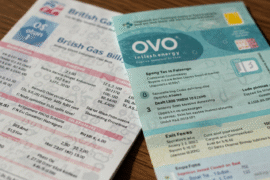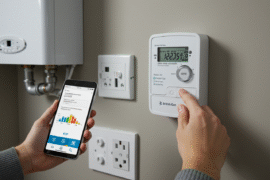This article may contain references to products or services from one or more of our advertisers or partners. We may receive compensation when you click on links to those products or services. Nonetheless, our opinions are our own.
The information presented in this article is accurate to the best of our knowledge at the time of publication. However, information is subject to change, and no guarantees are made about the continued accuracy or completeness of this content after its publication date.
Key Highlights
- Gas cards help small businesses save on fuel expenses while offering valuable rewards.
- Fleet cards provide features like spending controls, driver management, and detailed reports.
- Assessing fuel consumption and comparing card benefits can help you make the right choice.
- Focus on rebate structures, network coverage, and extra perks like roadside assistance.
- Gas cards simplify expense tracking, accounting, and overall cost management.
Introduction
Managing fuel expenses is essential for small businesses aiming to optimize their finances. Gas cards offer a practical solution, not just for paying at the pump but also for earning rewards, controlling spending, and simplifying fuel tracking.
This guide explains how gas cards work, their benefits, and how to select the best option for your business.
Voted "Best Overall Budgeting App" by Forbes and WSJ
Monarch Money helps you budget, track spending, set goals, and plan your financial future—all in one app.
Get 50% OFF your first year with code MONARCHVIP
Understanding Gas Cards for Small Businesses
Gas cards function similarly to business credit cards but come with specialized features for fuel purchases. These cards are accepted at most gas stations, making them convenient for companies with mobile operations.
Beyond convenience, gas cards provide cost-saving opportunities, such as:
- Discounts per gallon of fuel.
- Detailed tracking of purchases.
- Spending limits for drivers.
These features streamline expense management, reduce paperwork, and improve financial efficiency.
The Basics of Gas Cards
A gas card (or fuel card) is a business credit card designed specifically for fuel-related purchases. Unlike regular business credit cards that cover a wide range of expenses, gas cards focus primarily on fuel and vehicle-related services, such as:
- Gasoline and diesel purchases.
- Oil changes and car washes.
- Emergency roadside assistance.
How Gas Cards Work
Using a gas card is simple:
- Swipe the card at the gas station.
- Enter a unique driver PIN for security.
- Track transactions automatically through online reporting.
This automation eliminates the need for paper receipts and manual tracking, making financial reporting easier.
Benefits of Using Gas Cards for Expense Management
Gas cards help businesses maintain better financial control with:
- Spending controls: Set limits on how much drivers can spend, where they can buy fuel, and when purchases can be made.
- Streamlined accounting: Automatic tracking of fuel expenses simplifies tax reporting and financial management.
- Improved cash flow: Consolidated billing cycles allow for smoother budgeting.
By integrating gas cards into daily operations, businesses can reduce fuel-related costs while improving efficiency.
A Beginner’s Guide to Selecting the Right Gas Card
Choosing the right gas card requires evaluating your business’s fuel usage and comparing card features. Follow these steps to make the best choice.
Step 1: Assess Your Business’s Fuel Consumption
Start by calculating your monthly or annual fuel expenses. Consider:
- The number of vehicles in your fleet.
- Fuel types used (diesel, unleaded, etc.).
- Preferred gas stations based on business routes.
This analysis helps match your spending habits with the right gas card.
Step 2: Compare Card Features and Benefits
Once you understand your fuel needs, compare different gas cards based on the following factors:
1. Rewards Programs
- Cashback: Some cards offer a percentage of cash back on fuel purchases.
- Per-gallon discounts: Direct savings at the pump.
- Points-based rewards: Earn points to redeem for future fuel discounts or business expenses.
2. Network Coverage
- Some cards are brand-specific, meaning they only work at certain gas stations.
- Others have nationwide coverage, offering flexibility.
3. Additional Perks
- Roadside assistance for emergencies.
- Mobile apps for real-time transaction monitoring.
- Accounting software integration for automatic expense tracking.
Comparison Table
| Feature | Card A | Card B | Card C |
|---|---|---|---|
| Rewards | 2% cash back | 5 cents off per gallon | Points towards free fuel |
| Network | Limited to specific brands | Nationwide coverage | Regional coverage |
| Perks | Roadside assistance | Mobile App | Accounting integration |
Evaluating these aspects ensures you select the best gas card for your business.
Conclusion
Gas cards provide small businesses with a cost-effective way to manage fuel expenses and streamline accounting. By selecting the right card, businesses can:
- Reduce fuel costs.
- Improve financial tracking.
- Gain access to valuable rewards.
To maximize benefits, assess your fuel usage and compare different gas card features. A well-chosen gas card can enhance financial efficiency and contribute to long-term business savings.
Frequently Asked Questions
Can any small business qualify for a gas card?
Most small businesses are eligible, but qualification criteria vary. Some providers assess business credit history, while others require a personal guarantee.
What are the requirements for applying for a gas card?
Typical application requirements include:
- Basic business details (EIN, business phone number, etc.).
- Owner’s personal information (SSN for credit verification).
- Business credit history (if applicable).
How do gas cards help manage small business expenses?
Gas cards:
- Automate fuel expense tracking.
- Allow business owners to set spending limits for employees.
- Provide detailed reports to monitor usage.
Are there gas cards specifically designed for fleets?
Yes, fleet gas cards cater to businesses with multiple vehicles. They offer:
- Per-gallon discounts.
- Detailed transaction reports for each driver.
- Large discount networks for fuel savings.
Can gas card rewards significantly reduce business expenses?
Yes! Depending on the card, rewards such as cashback, per-gallon discounts, and statement credits can substantially lower fuel costs over time.

Reviewed and edited by Albert Fang.
See a typo or want to suggest an edit/revision to the content? Use the contact us form to provide feedback.
At FangWallet, we value editorial integrity and open collaboration in curating quality content for readers to enjoy. Much appreciated for the assist.
Did you like our article and find it insightful? We encourage sharing the article link with family and friends to benefit as well - better yet, sharing on social media. Thank you for the support! 🍉
Article Title: Gas Cards for Small Business: Save on Fuel Costs and Manage Expenses
https://fangwallet.com/2025/02/08/gas-cards-for-small-business/The FangWallet Promise
FangWallet is an editorially independent resource - founded on breaking down challenging financial concepts for anyone to understand since 2014. While we adhere to editorial integrity, note that this post may contain references to products from our partners.
The FangWallet promise is always to have your best interest in mind and be transparent and honest about the financial picture.
Become an Insider

Subscribe to get a free daily budget planner printable to help get your money on track!
Make passive money the right way. No spam.
Editorial Disclaimer: The editorial content on this page is not provided by any of the companies mentioned. The opinions expressed here are the author's alone.
The content of this website is for informational purposes only and does not represent investment advice, or an offer or solicitation to buy or sell any security, investment, or product. Investors are encouraged to do their own due diligence, and, if necessary, consult professional advising before making any investment decisions. Investing involves a high degree of risk, and financial losses may occur including the potential loss of principal.
Source Citation References:
+ Inspo












































